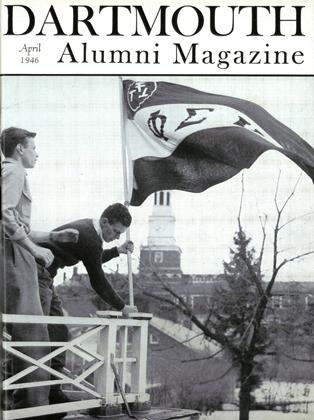Readers of this column need not be reminded that this is the muddy season in Hanover, the not-quite-vernal interim between the end of basketball, hockey, skiing, squash, and swimming and the beginning of baseball, outdoor track, lacrosse, and the other delights of the brief local spring. News of these various activities is somewhat on the fragmentary side this month and we will serve it up to you in that fashion
The banquet which concluded the victorious basketball season was a gala occasion, with Proiessor Joe McDonald of the Department of Economics and the Athletic Council acting as master of ceremonies and tributes to the team given by President Emeritus Ernest Martin Hopkins and Coach Ossie Cowles. The feature speaker of the evening was a Dartmouth man who had played a little basketball himself back in the late 'twenties, during which time he had performed as a substitute center for Lanky Langdell in 1928. This alumnus has always maintained his interest in Dartmouth basketball and said so with charm and felicity on this occasion. Fellow named John Dickey
The Indoor Intercollegiates represents the only actual athletic event since our last communication, a gathering in which Dartmouth came in a commendable fifth, although considerably behind such power-studded aggregations as the Army, Navy, and New York University. Point scorers for Dartmouth were Sam Felton in the 35-pound weight, John Hanley in the two mile, and Joe Conley in the high jump for a combined team total of some 12 points. Coach Ellie Noyes can be well satisfied at the performance of his charges at the end of his first indoor season
Jeff Tesreau has just called out baseball candidates in the cage and is currently laboring with scores of ambitious pitchers, catchers, infielders, and outfielders, many of them just back from military service. At this juncture, Jeff has not learned all their names yet, much less had any opportunity to see them under competitive conditions. By this time next month, however, he should have been able to separate the ball players from the rest of the group, a process concerning which we will keep you duly informed. One of the interesting angles on the competition for positions on this first postwar team will be the struggle between the prewar players returning from service and the naval and marine personnel who played last .spring and are for the most part still in College, either as new civilians or still in uniform.
With the spring schedules Dartmouth returns to a reasonable facsimile of a prewar schedule, with the exception of a dual meet or so in track and some doubleheaders in baseball. Few of the track teams in this part of the country are yet sufficiently strong or well-rounded to welcome an immediate return to large scale dual meet competition, although many of them (like Dartmouth) have enough capable performers to do themselves credit in a bigger meet which does not necessitate strength in every event—or even a majority thereof. The baseball team is presumably still attempting to minimize travel to and from this remote but delightful little hamlet by scheduling its league games almost exclusively as doubleheaders
One of the most heartening signs to all true aficionados of local sport is the number of large, bulky and dimly familiar young men drifting back to the campus, many of them with their uniforms still on or sporting various G.I. items. They are the prewar performers in a variety of Dartmouth sports who are coming back from the wars to resume their undergraduate careers—three, four, and sometimes five years older—but still eager to complete their months or years on the playing fields. All of the institutions of higher learning throughout the country are likewise experiencing this mass return of the native. We somehow derive a certain wistful satisfaction and comfort—in the Atomic Age—from contemplating this small example of the continuity of human affairs.
A PRELIMINARY HUDDLE of Dartmouth football coaches, who recently launched spring practice, includes (left to right) Dick Cassiano, returned backfield coach; Milt Piepul, also backfield mentor; Head Coach Tuss McLaughry; and George Barclay, back as line coach after serving with the Navy.
AS INFALLIBLE AS THE FIRST ROBIN is this gym evidence that Hanover's spring is not far off. Baseball practice in the cage finds Bob Amirault '5O belting one into the rafters and Charlie Cashin '45, formerly Second Lieutenant in the Army Air Corps, -working out behind the plate.
 View Full Issue
View Full Issue
More From This Issue
-
 Class Notes
Class Notes1918
April 1946 By ERNEST H. EARLEY, DONALD L. BARR -
 Article
ArticleLabor Marches With the Times
April 1946 By MALCOLM KEIR, -
 Article
ArticleTHE NEW CURRICULUM
April 1946 By PROF. HUGH S. MORRISON '26, -
 Class Notes
Class Notes1917
April 1946 By MOTT D. BROWN, DONALD BROOKS -
 Class Notes
Class Notes1911
April 1946 By NATHANIEL G. BURLEIGH, EDWIN R. KEELER -
 Article
ArticleEducational Aims
April 1946 By PROF. CHARLES LEONARD STONE '17
Francis E. Merrill '26
-
 Books
BooksGAUGING PUBLIC OPINION
June 1944 By Francis E. Merrill '26 -
 Sports
Sports1946 Varsity Football Roster
October 1946 By Francis E. Merrill '26 -
 Sports
SportsCORNELL 27, DARTMOUTH 26
December 1948 By Francis E. Merrill '26 -
 Sports
SportsHOCKEY
February 1950 By Francis E. Merrill '26 -
 Sports
SportsWith Big Green Teams
December 1950 By Francis E. Merrill '26 -
 Sports
SportsReport Card
June 1952 By Francis E. Merrill '26








